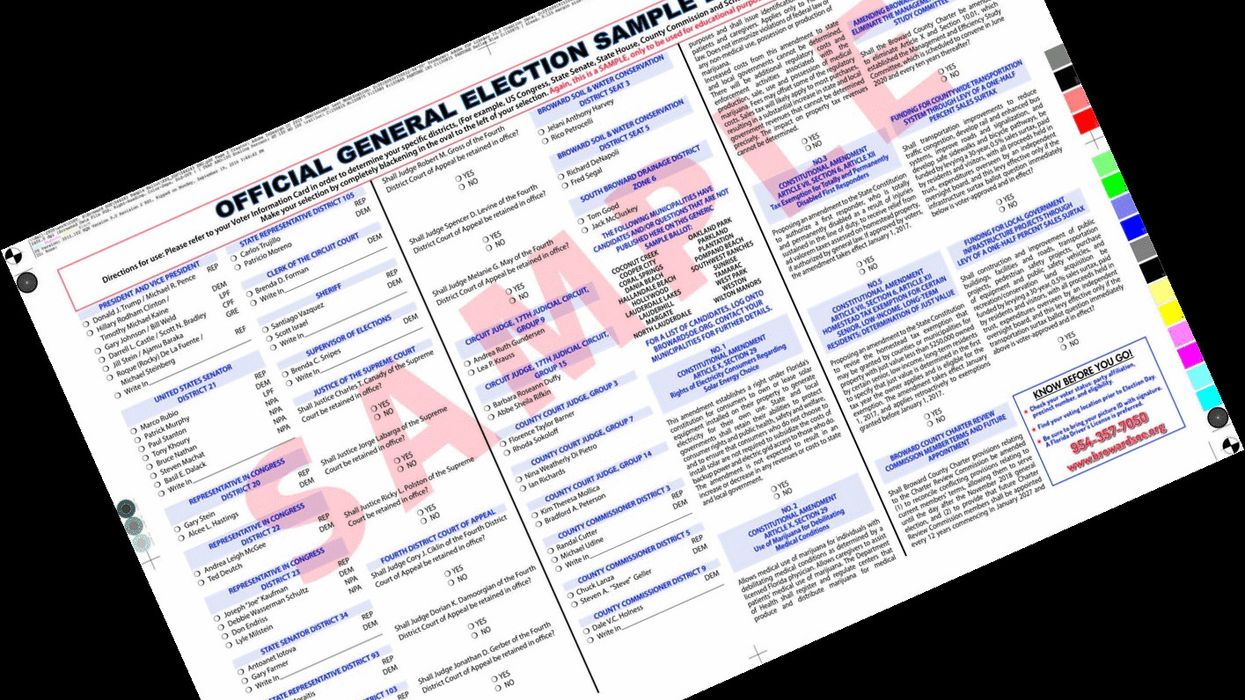Republicans may hang on to the top spot on Florida ballots, a federal appeals court has decided — a significant boost for the GOP in the biggest purple state, and also perhaps the biggest defeat yet for Democrats counting on winning a wave of lawsuits that boost their prospects this fall.
The ruling Wednesday was mainly on technical grounds but nonetheless nullified a lower court decision. Last November a federal trial judge declared unconstitutional a Florida law awarding the most prominent place on every ballot to the governor's party. That design feature guarantees an artificial boost in the vote of candidates from the benefiting party.
Such laws are a feature of a system assuring the major parties can box out worthy insurgent and independent candidates, democracy reformers lament. The parties listed second view such measures as arbitrary and discriminatory, arguments the Democrats have made in challenging first-on-the-page laws the past year not only in Florida but also in Texas, Georgia and Arizona.
The case in Florida, where the occupant of the governor's office means the GOP has been listed first on every ballot since 1999, has proceeded furthest. The 11th Circuit Court of Appeals dismissed the complaint on the grounds that the plaintiffs, several Democratic voters and campaign organizations, lacked the standing to sue and sued the wrong people.
Judge William Pryor also said the Democrats had not proved they were being harmed by the seven-decade-old law.
That was the opposite of what District Judge Mark Walker of Tallahassee had said in November, when he ruled the law impermissibly "allows a state to put its thumb on the scale and award an electoral advantage to the party in power." His decision pointed to experts who testified that listing GOP candidates first gave them as much as a 5-point advantage in Florida's elections.
Earlier this month Walker had ordered the state to come up with a more equitable ballot architecture by the end of May, accusing Florida officials of slow-walking their planning in hope of winning their appeal.
The attorney leading the lawsuit campaign by the Democratic National Committee and the party's congressional campaign arms, Marc Elias, signaled that an appeal would be filed soon.
"Arguing that Democrats are not harmed by an illegal and unwarranted 5 percent Republican advantage in every single election in the state is wrong, inconsistent with running a fair election, and we are considering all of our options in this case," he said. "We can assure you that we will take whatever steps are necessary to protect Florida voters this November."
Absent a quickly successful appeal, however, President Trump's name will be first on the November ballots in all 67 counties. He is counting on the state's 29 electoral votes, but former Vice President Joe Biden has led in recent polling. The state has been a tossup every year since 1996 and has narrowly gone for the winner every time. The 2016 margin was just 113,00 votes out of 9.1 million cast.
That margin of 1.2 points is much less than the 5 percent cited in the case.
The other ballot primacy lawsuits remain in the trial courts. Georgia and Arizona are looking at highly competitive Senate races this fall, and Biden appears to have a shot at carrying their combined 27 electoral votes. Texas is more of a long shot for him and the Democratic Senate challenger but is not entirely out of reach.
Republicans have been listed first on the ballot in every election in Arizona for almost a decade, in Georgia for more than a decade and in Texas for two decades.
Georgia is also in the jurisdiction of the 11th Circuit and so that claim's future could be limited by Wednesday's decision.
Political operatives pay so much attention to the vote-getting power of topping the ballot that they have several nicknames for it: The "primacy effect," the "windfall vote" and the "donkey vote."
The high partisan stakes in the Florida case were reflected in the 11th Circuit's decision. Pryor, a nominee of President George W. Bush, was joined in most of his opinion by Judge Robert Luck, a nominee of President Trump. Dissenting on several issues was Judge Jill Pryor, put on the court by President Barack Obama.




















